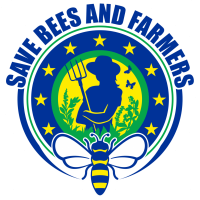Today the European Commission presented their formal reply to the 1,1 million citizens who signed the European Citizens Initiative “Save Bees and Farmers”. They welcome the initiative as a clear sign of broad public support for action for pollinators, biodiversity and sustainable farming. They urge the European Parliament and the Council to find swift and ambitious agreements on the legislative proposals to reduce pesticides and restore biodiversity. The organisers of the ECI stress the urgency and importance of pesticide reduction to protect people's health, biodiversity and sustainable food production. The widespread and negative effects of synthetic pesticides become clearer with every study published. We urge for more ambition by EU Parliament and Member States. We encourage involvement of concerned citizens and scientists in the process till the goals are achieved. Save Bees and Farmers is far from over.
The ECI is the only participatory democratic instrument in the EU that enables citizens to engage in EU policy-making. Over a million EU citizens that sign a formal request, giving their personal details with date of birth and in many countries their ID number, is a very strong signal. They ask for an 80% reduction of synthetic pesticides by 2030 and a total phase out by 2035, with support for farmers to work with nature rather than against it, ensuring a recovery of biodiversity on agricultural land. This should be taken very seriously by all EU institutions and politicians, especially with EU scepticism on the rise.
The Save Bees and Farmers ECI is the seventh successful ECI and it collected 1,1 million valid signatures. The ECI survived the COVID-19 pandemic, which rendered the campaigning and signature collection very difficult.
This ECI addresses an urgent subject, important for many: phasing out the use of synthetic pesticides to protect the environment and produce healthy food. It touches many aspects of our lives: biodiversity, healthy food, safe working conditions for farmers, clean water, fertile soil, the joy of a clean environment and the possibility to produce food in the long run. Without biodiversity, no agriculture. The European Commission is very well aware of that and has presented important legislative proposals after the start of our ECI in 2019. The pesticide reduction regulation (SUR) and the Nature Restoration Law are meant to protect the health of farmers and citizens and restore biodiversity. The recently launched Pollinators Initiative will support this.
No more delay: speed up, with more ambition
The cautious EU proposals are very important and deserve more ambition. Instead, part of the politicians in the European Parliament, as well as many member states prefer to listen to the lobby of the pesticide producers and delay the decision making process. Many false arguments are repeated over and over again in the discussions involving EU and national policy makers.
Martin Dermine from PAN Europe, and main citizens representative of this ECI says: “There is more and more scientific proof of the dire state of biodiversity and the danger of pesticides to our health. We can have no food production without biodiversity. We now have proof that pesticides spread much more than previously thought. They are found everywhere and even accumulate in house dust. Many substances are especially dangerous for the unborn and young children, in very low doses. It is also increasingly clear that they are an important factor in the unfolding Parkinson’s epidemic, as well as the rise in cancers.”
Helmut Burtscher-Schaden, GLOBAL 2000, deputy ECI representative adds: "In the face of the current crisis, there is no alternative to reducing pesticide use and restoring biodiversity. We therefore endorse the Commission's call on co-legislators to find swift and ambitious agreements on their legislative proposals that will translate the citizens’ ambition into law.. The most harmful pesticides must be banned in the first place. To do this, we need a meaningful risk indicator. The current indicator is absolutely unacceptable and counterproductive. It would only protect the status quo."
Madeleine Coste, Slow Food, actively involved in the ECI adds: “We need faster progress to make sure our food system is healthy, sustainable and climate resilient. We cannot continue ignoring the fact that clean water, healthy soils, biodiversity, and food producers who work in ways to protect nature, are essential to feed the world. We need much stronger support to farmers to put an end to their dependence on pesticides and more recognition of those who are already working with nature instead of destroying it. We expect the EU and member states to support and stimulate this and align the CAP and other food-related policies to further an agroecological transition.”
Save Bees and Farmers ECI is far from over
Martin Dermine concludes: “We will closely watch the follow up. An ECI is more than just a signature with personal data, it is an active involvement in the process. We will monitor the evolution of the political situation, debunk false statements and stimulate citizens to contact their national and EU politicians to show their involvement in every step. With the upcoming EU elections, politicians will have to show that they serve the common interests for health, clean water, good food and biodiversity and to strengthen farmers’ position in the food chain. Our future and that of our children and grandchildren should prevail over the profits of agribusiness.”
More information
- Martin Dermine, martin [at] pan-europe.info, +32 486 32 99 92
- Helmut Burtscher-Schaden, helmut [at] global2000.at, +43 699 14200034
